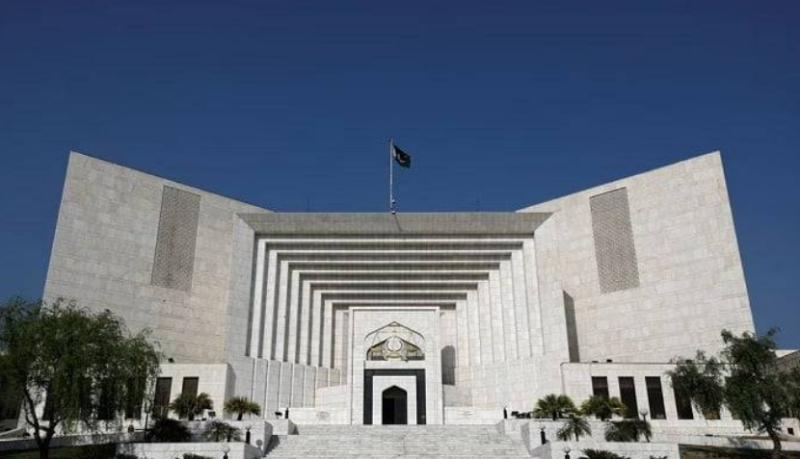Islamabad (Web Desk): The Supreme Court (SC) on Monday resumed hearing seeking a review of the top court’s 2022 verdict on the defection clause under Article 63-A of the Constitution.
The review petition, filed by the Supreme Court Bar Association (SCBA), is being heard by a newly formed five-member bench led by Chief Justice Qazi Faez Isa along with Justice Amin-ud-Din Khan, Justice Jamal Khan Mandokhail, Justice Mazhar Alam Khan Miankhel and Justice Naeem Akhtar Afghan.
Justice Naeem Akhtar Afghan has replaced Justice Munib Akhtar in the newly-formed bench of the top court.
On Monday, Justice Munib Akhtar refused to hear the appeal, penning a letter wherein he had questioned the inclusion of ad hoc judge, Justice Mazhar Alam Khan Miankhel, in the bench.
The CJP had adjourned the hearing till Tuesday (today) saying that the judge would be requested to rejoin the bench.
"We will try to bring Justice Munib Akhtar back to the bench, otherwise, the bench will be reconstituted," CJP Isa said.
In a letter to SC, Justice Munib said that he did not recuse from the bench, saying he cannot be a part of a bench that was constituted by Practice and Procedure Committee.
"My letter should be made a part of the case record," said Justice Munib, to which CJP Isa said this could not happen.
He added that it would have been appropriate had Justice Munib given his opinion after being part of the bench.
In a letter to SC, Justice Munib said that he did not recuse from the bench, saying he cannot be a part of a bench that was constituted by Practice and Procedure Committee.
"My letter should be made a part of the case record," said Justice Munib, to which CJP Isa said this could not happen.
He added that it would have been appropriate had Justice Munib given his opinion after being part of the bench.
It is pertinent to mention that the originally formed five-member bench, headed by CJP Qazi Faez Isa, had comprised Justice Aminuddin, Justice Jamal Khan Mandokhail, Justice Mazhar Alam, and Justice Munib Akhtar.
In 2022, the SC announced that parliamentarians cannot vote against their party policy, adding that the votes of dissident lawmakers will not be counted.
The top court, issuing its verdict on the presidential reference that sought its interpretation of Article 63-A of the Constitution, which pertains to the disqualification of lawmakers over defection, said that the “article concerned cannot be interpreted alone.”
The decision by the SC was a 3-2 split decision, with a majority of the judges not allowing lawmakers to vote against the party line in four instances outlined under Article 63-A. These four instances are the election of a prime minister and chief minister, a vote of confidence or no-confidence, a Constitution amendment bill, and a money bill.
Later, the Supreme Court Bar Association’s (SCBA) requested the SC to direct all state functionaries to act strictly in accordance with the Constitution and the law, and ask them to restrain from acting in any manner detrimental to and unwarranted by the Constitution.
“The apex court’s opinion about not counting the dissident’s votes is against the Constitution and equal to interference in it,” the SCBA said.
According to Article 63 (A) of the Constitution, a parliamentarian can be disqualified on grounds of defection if he votes or abstains from voting in the House contrary to any direction issued by the parliamentary party to which he belongs, in relation to the election of the prime minister or chief minister, or a vote of confidence or a vote of no-confidence; or a money bill or a Constitution (amendment) bill”
The Article says that the party head has to declare in writing that the MNA concerned has defected but before making the declaration, the party head will provide such member with an opportunity to show cause as to why such declaration may not be made against him.
After giving the member a chance to explain their reasons, the party head will forward the declaration to the speaker, who will forward it to the chief election commissioner (CEC).
The CEC will then have 30 days to confirm the declaration. If confirmed by the CEC, the member “shall cease to be a member of the House and his seat shall become vacant”.


